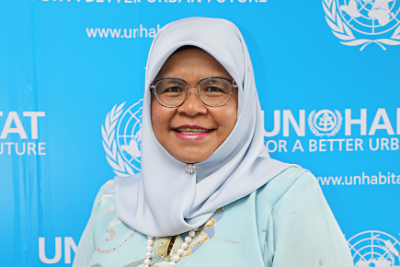Written by Maimunah Mohd Sharif, UN-Habitat Executive Director
Digitalisation, big data, connectivity and Artificial Intelligence are shaping today's cities around the globe. The increasing use of digital technologies in human settlements and cities offers immense opportunities if well governed.
Smart technology can contribute towards sustainable development, by reducing carbon emissions and facilitating the ecological transition, increasing access to affordable housing, enhancing participation in policy making for citizens, and ensuring access to inclusive services for communities.
Our digital future can help to bridge social divides and improve the living conditions for all. The importance of digitalisation in managing sustainable urbanisation has been captured in several key guiding documents such as the 2030 Sustainable Development Agenda as well as the New Urban Agenda.
The UN Development System has anchored digitalisation and technologies as frontier issues in its UN System-wide Strategy on Sustainable Urban Development, with UN-Habitat taking a coordinating and technical advisory role.
In this regard, UN-Habitat expanded deployment of frontier technologies and innovation as a key outcome area in its Strategic Plan 2020 - 2023. All documents underline that the benefits of digitalisation need to be channelled towards accelerating efforts to reach the Sustainable Development Goals by 2030.
Concrete examples of UN-Habitat’s engagement with partners have been in the field of transport planning, service delivery and urban safety monitoring. Moreover, in humanitarian contexts UN-Habitat has been coordinating GIS and data-science based urban and neighbourhood profilingto prioritize short-term humanitarian interventions and longer-term urban recovery efforts.
The COVID-19 pandemic illustrates that digitalisation has the potential to strengthen cities’ resilience in times of crisis. Due to the imposed lockdowns, local governments are providing a series of services online, they are creating digital platforms for neighbourhood assistance and contact tracing apps are being introduced to limit the spread of the pandemic.
UN-Habitat promotes technologies which are used in an inclusive, resilient and sustainable way while mitigating the related risks such as unreasonable surveillance or the invasion of privacy.
The "One-UN" approach and extensive partnerships are vital in order to harness the potential of digitalisation in an inclusive, resilient and sustainable way.
UN-Habitat ensures a close collaboration with other agencies in accordance with the UN System-Wide Strategic Document (SWSD) to support the implementation of the 2030 Agenda for Sustainable Development. Partner agencies in the field of digitalisation include, among others, ITU and UNECE in the United for Smart and Sustainable Cities (U4SSC) initiative as well as UNDP. These cooperation efforts prevent overlapping and fill capacity as well as knowledge gaps from individual agencies.
Moreover, UN-Habitat partners with external stakeholders such as cities platforms, local and national governments, academia, private sector and civil society entities (such as the Cities for Digital Rights Coalition).
There is an opportunity for UN-Habitat to take a technical advisory and convening role and bring many of these actors together in a coordinated way to ensure a coherent and inclusive approach to tackle the challenges of an increasingly digitalised world while placing people at the centre of smart city approaches.


